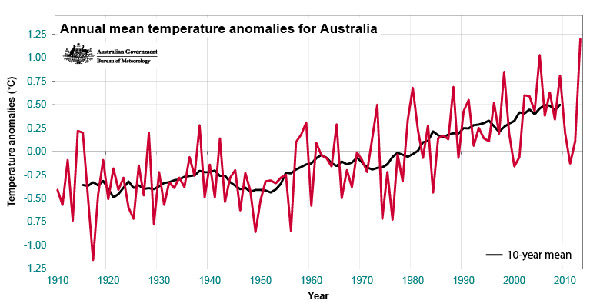Australia had its warmest year on record, with annual temperatures 1.2 degrees Celsius (2.16 degrees Fahrenheit) above the 1961-1990 average, according to a new analysis from Australia’s Bureau of Meteorology (BOM). This is 0.5 degrees Celsius higher than the previous warmest year on record—2005—for Australia. Global warming due to burning fossil fuels is increasing temperatures worldwide.
“The Australian region warming is very similar to that seen at the global scale, and the past year emphasizes that the warming trend continues,” the BOM writes. “As summarized in the recent Intergovernmental Panel on Climate Change (IPCC) Fifth Assessment Report, recent warming trends have been dominated by the influence of increasing greenhouse gases and the enhanced greenhouse effect.”
In addition to being the warmest year on record for the country, 2013 also saw the warmest summer and springs in Australia. January 7th, 2013, was the warmest day yet recorded in Australia with an average maximum of 40.3 degrees Celsius (104.5 degrees Fahrenheit).
Despite the impact of climate change on the country, Australia’s new government under Tony Abbott has recently attacked the country’s climate policies, including its carbon tax. In addition to pledging to abolish the tax, the Abbott administration has already abolished an independent advisory committee on climate change and drastically cut renewable energy funding. The Abbott administration has also thrown massive support behind new coal mining projects, including new ports that environmentalists say could devastate the already-ailing Great Barrier Reef.

Graph courtesy of BOM. Click to enlarge.
In response to the news from BOM, the head of the Green party in Australia, Richard Di Natale, called Abbott a “reckless ideologue who ignores the science and is intent on listening to people who are part of the tinfoil hat brigade.”
While Abbott has expressed doubts about climate science in the past, he recently stated that he accepts the reality of anthropogenic climate change. But many remain skeptical.
“[Tony Abbot] thinks [climate change is] absolute crap and the policy he has is a con job that you have when you think climate change is absolute crap,” said Labor leader, Penny Wong.
Last week, Australia was sweltering under another heatwave: temperatures in the interior hit over 50 degrees Celsius (122 degrees Fahrenheit).
Related articles
Global warming could upset Antarctic food chain

(01/02/2014) Resting near the bottom of the foodchain, Antarctic krill (Euphausia superba) underpin much of the Southern Ocean’s ecosystem. But in a rapidly warming world, these hugely-abundant crustaceans could see their habitat shrink considerably. In a recent paper in PLOS ONE, scientists predict that Antarctic krill could lose 20 percent of their growth habitat, or 1.2 million square kilometers.
Climate change drives Florida mangroves northward
(12/30/2013) A decline in the frequency of extreme cold weather in Florida has allowed coastal mangrove forests to expand northward, finds a study published this week in Proceedings of the National Academy of Sciences.
World suffers warmest November on record

(12/18/2013) Last month was the warmest November on record, according to new analysis from the NOAA. Temperatures were 0.78 degrees Celsius (1.40 degrees Fahrenheit) above the average November in the 20th Century. Global temperatures are on the rise due to climate change caused primarily by burning fossil fuels, but also by deforestation and land-use change.
Reforestation can’t offset massive fossil fuels emissions

(12/13/2013) With the Australian, Japanese, and Canadian governments making an about-face on carbon-emissions reduction targets during the Warsaw climate summit, some experts are warning that the global need for solutions offsetting CO2 emissions is passing a “red line.” Land-based mitigation practices comprise one of the solutions on the table as a result of both the United Nations Framework Convention on Climate Change (UFCCC) and the Kyoto Protocol; however, a paper published in Nature Climate Change by an international team led by Brendan Mackey, has raised the looming question of whether or not land-based practices can actually improve CO2 levels as much as hoped.
Top scientists propose ambitious plans to safeguard world from devastating climate change

(12/05/2013) Two degrees is too much: that’s the conclusion of a landmark new paper by top economists and climatologists, including James Hansen formerly of NASA. The paper, appearing in the open-access journal PLoS ONE, argues that global society must aim for only one degree Celsius of warming above pre-industrial levels to avoid the worst impact of climate change, and not the two degrees Celsius agreed on by the world’s governments. But given that the world’s governments are not yet on track to even achieve the two degree target, how could we lock in just one? A combination of renewable energy, nuclear power, and, most importantly, a rising price on carbon emissions, according to the eighteen scientists.







